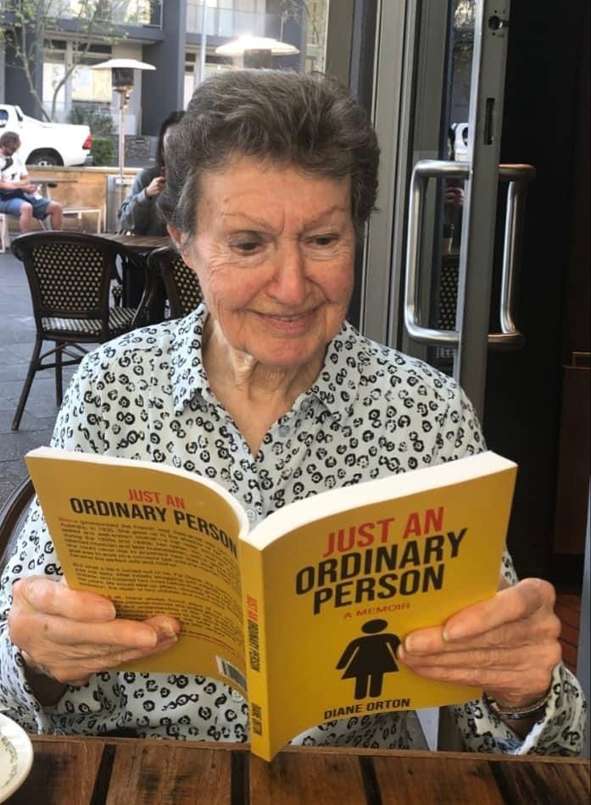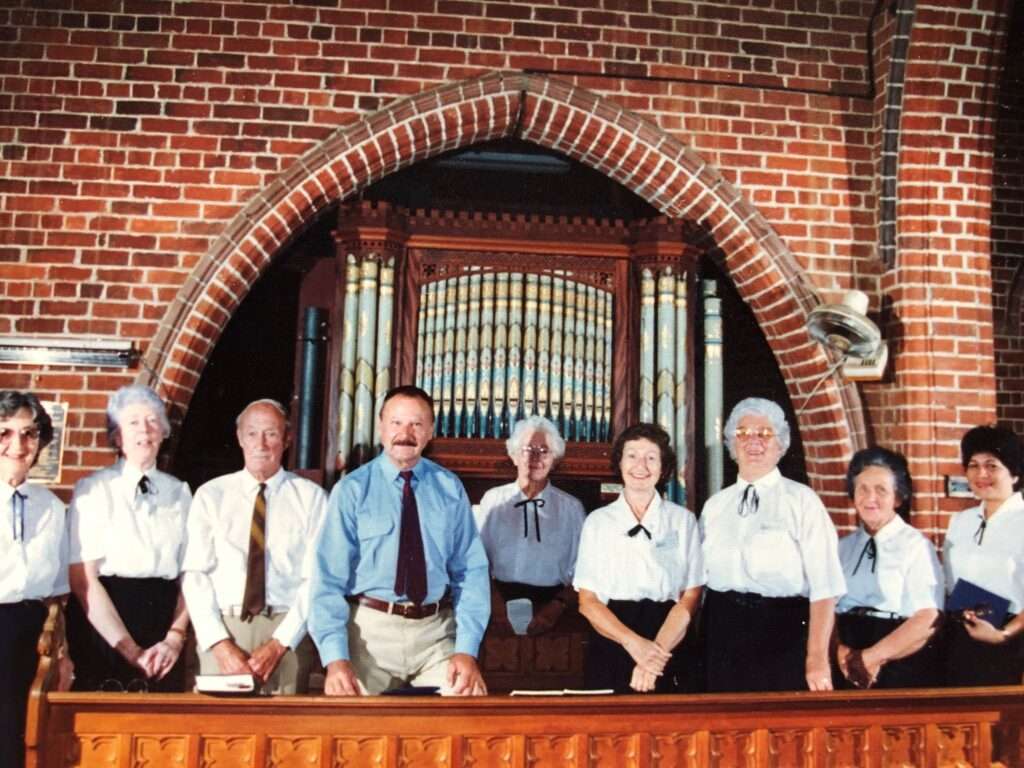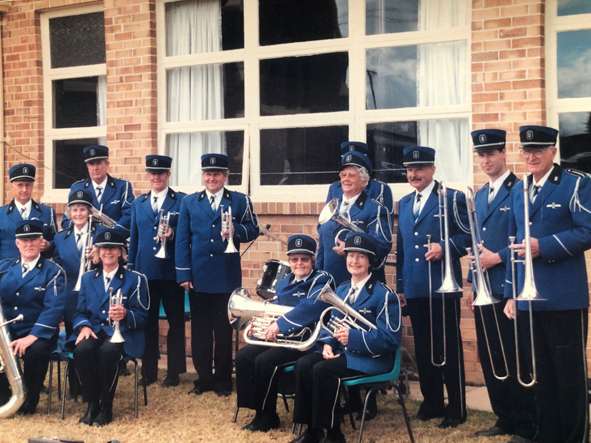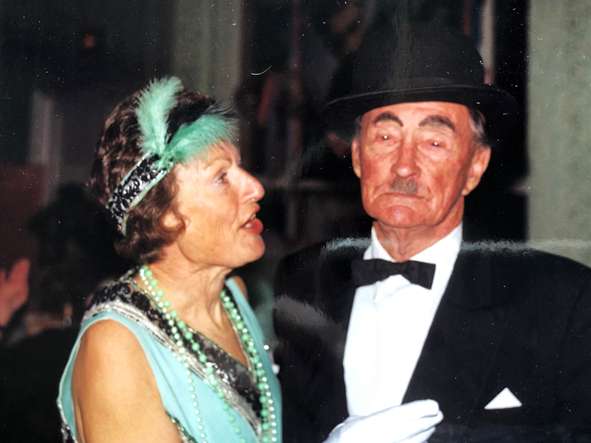
Diane (said the French wayÖDee-arne) lived in Barraba from 1996 to 2006. Born in 1935, Diane has had a long and interest- ing life and has captured some of it on the pages of her new book. An important part of Dianeís life was spent in Barraba, and ìJust An Ordinary Personî includes stories and memories from that time.
Diane grew up in the shadow of an extraordinarily skilled and well- known mother – a top radio announcer in Australia during the 1930s and ë40s. Her father, too,was an outstandingly talented musician and later businessman, with a ëgenius IQí. Believing she could never rise to anywhere near their level, Dianeís childhood goal was to work on a conveyer belt until she married, had children and became the perfect mother.
As it turned out the road to motherhood for Diane was not easy. After initially struggling with infertility, she adopted two children and fostered two more before final- ly giving birth to three. Over the years, life would deal up affairs, divorces, a sonís devastating drug addiction, the death of two children and much more.
Through it all, Diane always found ways to survive, as well as thrive. In her personal memoir she writes about her ongoing spiritual development and understanding of the ëbig questionsí, while providing a glimpse of life in Australia during the 20th century, including life in Barraba at the turn of the century.
Diane launches her book, available on Amazon, at The Playhouse Hotel on Thursday 22 October. Anyone wishing to attend the launch may email Diane on [email protected].

Familiar faces in St Lawrence choir 
Diane with the shire band seated front right 
Diane and JL in fancy dress
An extract from ‘Just An Ordinary Person’ by Diane Orton
It seems that anyone whoís lived in Barraba describes it as ëa special placeí. I certainly found it to be so. The people were most welcoming. For a tiny, isolated town it offered a lot, and I soon got involved in many activities. I joined Barrapella, an a capella choir. I joined the Anglican church choir, and later became the churchís organist. I joined a Tai Chi class, and I even joined the Barraba Shire Brass Band and played in it for the ten years I was there. I was offered an instrument and free lessons, so I began with the cornet before moving on to the tenor horn, which was easier for me to blow.
Singing in Barrapella was anoth- er great joy. This choir was once described as ëa drinking group with a singing problemí. Once a week we met at Andyís Backpackers (now Guesthouse) in the early evening. Some of the choir mem- bers came straight from work, so our host (and leading bass singer) always had chilled beer, wine, crackers and dips at the ready. In wintertime there was a welcoming log fire. Our lovely and most capa- ble choir director was not a pianist, so all the singing was unaccompa- nied. We sang a huge variety of songs from many countries and in many languages, and our vast repertoire included a number of gospel songs. At performances, everything was sung from memory.
and lovingly transformed into a multipurpose cinema and regional centre for the performing arts. Bob Carr, the then-Premier of NSW, was a special guest, and we per-formed our show piece ëOh Happy Dayí (the Sister Act version). The second Bingara event was in that same hall, but it was a dramatic stage production based on Dickensí A Christmas Carol. Iíd been asked to select and train a small group of choristers to play the roles of English carol singers. We were required to sing a number of traditional carols, some onstage and some offstage, throughout the many performances. We also sang a bracket of carols in the foyer as the audiences arrived. Iíll never for- get how hot and uncomfortable it was backstage, in the dark, in the middle of that hot summer. We were dressed in thick, floor-length, long-sleeved, high-necked cos- tumes and had to hold torches on our scripts as we strained to hear our cues.
Iíd not been in Barraba long when I met JL. He was always referred to by his first two initials, though I came to call him Johnny. I was sixty-one and he was eighty- one when we met. JL was a widow- er who lived alone. Heíd been a farmer, and heíd also worked nights as caretaker at the nearby asbestos factory (now closed) when times were tough. A slim, energetic man, always smartly dressed and well groomed, he had a sharp wit and an honesty that could, at times, be shocking. I was with him once in the main street of Barraba when he met up with a woman heíd not seen for some time. His opening remark was, ëBlimey! Youíve put on some weight!í JL always said what was on his mind. Iíd never known any- one like him. Here was a man still living in the house he was born inó
There were some fabulous voices there. When that initial musical director left the area, the choir paid for school music teachers to travel from Tamworth and from Bingara to lead the choir. Eventually they too moved, and I went from singing ëtenorí to standing out front and being the musical director. By that time, we were singing a few accom- panied songs, so I sometimes directed from the piano. Barrapella always entered the Gunnedah eisteddfod and was often invited to sing away from home. Two memo- rable choir events under my leader- ship were at the town of Bingara, some sixty-two kilometres away. The first was a concert put on to a true Aussie ëman of the landí who called women ësheilasí, and whose vocabulary included many Australian colloquialisms and slang. But heíd been educated at a top private school, loved classical music (especially opera), was for- ever quoting Shakespeare, had a keen interest in everything and was knowledgeable in many subjects. JL had a fine singing voice and since he was seven years old had sung in the church choir, which Iíd joined. This lively old man also had a reputation for being a flirtóa ladiesí man. Heíd always enjoyed the company of women, though come Anzac Day he was very much a manís man, as he enjoyed celebrate the restoration and reopening of the magnificent Roxy Theatre – a former Art Deco movie theatre that had been closed for forty years before being beautifully wife, used the premises to publish the Barraba Gazette newspaper. Their office and the printing press- es were in the building. Clifton Hall adjoined Andyís. Some years before I left Barraba, Andy and I, along with several of our friends, formed a committee to look into buying and restoring the beautiful old building and running it as a cin- ema again. Many towns were doing this, and state government grants were available to assist with the costs. At the time, our nearest cin- ema was in Tamworth, 100 kilome- tres away. Years of work went into the project, which I headed. But in the end, we didnít get the neces- sary Council approval.
I was thrilled, however, when a member of our group decided to buy one of the four main street hotels. A local architect worked with him and, after some years, that former pub became The Playhouse Hotel, offering five-star accommodation, a superb venue for meetings and conferences, a cafe with amazing food and a the- atre-cum-cinema! Barraba resi- dents can now see a film most weekends, and visitors come from all over the country to events held there or to stay in top-class accom- modation while visiting the area. The Playhouse Hotel was still a work in progress when I left, but his beer and played two-up at the local RSL. JL had served overseas in World War II, and wore his medals with pride. He was a gen- tleman of the ëold schoolí. He liked to open the car door for a woman. He was caring and considerate. His attentions to me led to us becom- ing more than good company. I fell in love with him, and our relation- ship became an intimate one. It was a lovely time for both of us, as he got to know and spend time with my friends and I met all of his family and friends. We watched the Wimbledon tennis matches togeth- er until 3 am. We danced together for hours at a fancy dress ball. I held parties at his house.
Work of a different nature was chairing the Clifton Hall Restoration Project. Barraba had a heritage- listed Art Deco cinema, which had for many years been closed. It was owned by a local man who with his Barraba had (and at the time of writing, still has) an outstanding adult education organisation. It arranges classes of all kinds in other country towns as well as in Barraba. I was a member of its committee during my years there and enjoyed it very much. Something quite different, but which had some members in com- mon, was the local wine society. When I arrived in Barraba, I was a teetotaller, but when I left I was ërunningí its wine society! This group met in one anotherís homes once a month. Each person brought something to contribute to the three-course (plus nibbles), home-cooked meal. One of the members would bring the wines and talk about themóthatís where the organisation came in. To be decided were the dates, the venue, the menu and who would bring what. Everything was arranged by telephone. They were lovely get- togethers. The food, of course, was always superb; country towns have the best cooks. And the relaxed socialising and conversation in beautiful homes was something we all looked forward to from month to month.


